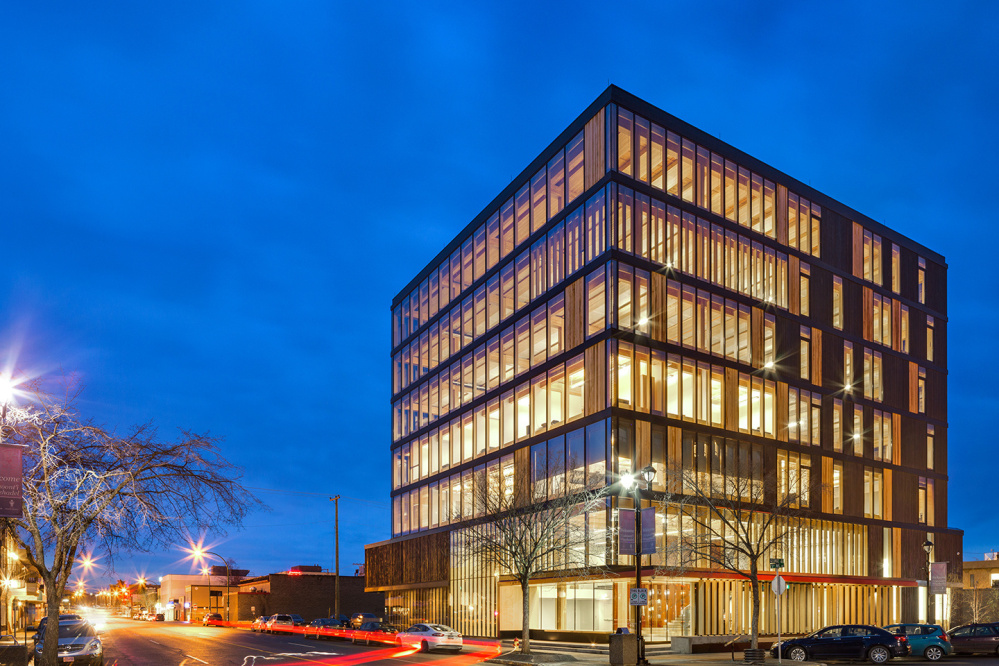SPRINGVALE — Maine badly needs to build some wooden high-rise buildings in downtown Portland.
We need timber towers as icons of a forest-based innovation economy. We need them to better connect rural Maine to Portland’s prosperity.
We need them as a pro-business response to the problem that climate change deniers dare not mention. And, just maybe, these structures will also change Portland’s ongoing debate over building heights and blocked views.
Cross-laminated timber technology has many desirable construction qualities that I won’t go into. Just know that it is possible to build sound wooden towers way taller than 175-foot Franklin Towers in Portland, Maine’s tallest building. Vienna is building a 275-foot wooden skyscraper, and Stockholm is building a 34-story wooden apartment building.
The significance of “plyscrapers,” as they are nicknamed, goes far beyond the ingenuity involved. They are flagships of a post-carbon world.
Maine should be leading this transition because ours is the most heavily forested state. Maine has made a step in this direction by creating the Advanced Structures and Composites Center in Orono, although the center is not yet in the high-rise building business.
Maine’s working forests are the engines in this story. They inhale carbon from the air and store it benignly in trunks, branches and roots.
While carbon in the atmosphere is bad, carbon stored in trees is good. And carbon stored in lumber and furniture is best of all. It stays sequestered and makes way for the next generation of trees to do their carbon thing.
The ability of forests to store carbon can actually be accelerated through better forest management and market development. Most harvested wood in Maine goes into short-lived wood products such as firewood, chips and paper, which store carbon only as long as they are neither unburned nor undecomposed. This is carbon neutrality, and forests can do better.
Forests can become climate-benefit multipliers when the harvest is shifted toward lumber and other long-lived products that displace energy-intensive building materials such as aluminum, concrete and steel.
“Every time we use wood, instead of something else … we’re avoiding emissions,” Bill Keeton, a University of Vermont forest ecology professor, says in a 2013 YouTube talk.
Keeton says these “substitution benefits” slowly accrue over time “until at some point, they actually exceed the total amount of biomass you could store, even in an unmanaged forest. This is what gets the forestry community really excited. Wow, these substitution effects are really large.”
Collectively, U.S. forests offset 15 percent of U.S. carbon emissions. Maine could become a climate leader by setting a higher goal and practicing a different kind of forestry. It would mean letting more trees grow bigger and older, which has all kinds of ecological benefits besides carbon storage.
This is not passive forestry because logging is essential in order to reap the full carbon benefits. Markets would need to be aggressively developed to ensure that higher harvest volumes actually displace less-green building materials.
There’s room for all ideologies here. “Market development” and “higher harvest volumes” have nice pro-business rings to them, don’t they? That is potentially the biggest benefit of all.
It may be the way conservatives finally embrace the reality of climate change. Climate denial is really anti-government ideology in another guise. Deniers cannot see a solution to climate change that does not involve big government, so they either deny its existence or claim there is nothing we can do about it.
Their biggest fear is not floods and droughts and refugee crises, but a new government agency.
It wouldn’t take a government agency to build some wooden skyscrapers in downtown Portland.
Copy the Story LinkSend questions/comments to the editors.



Success. Please wait for the page to reload. If the page does not reload within 5 seconds, please refresh the page.
Enter your email and password to access comments.
Hi, to comment on stories you must . This profile is in addition to your subscription and website login.
Already have a commenting profile? .
Invalid username/password.
Please check your email to confirm and complete your registration.
Only subscribers are eligible to post comments. Please subscribe or login first for digital access. Here’s why.
Use the form below to reset your password. When you've submitted your account email, we will send an email with a reset code.